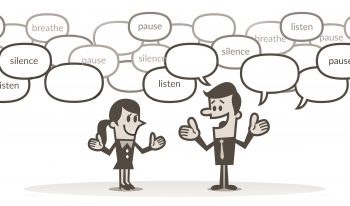Of all the skills that successful development professionals need to master, the art of understanding when to be quiet is perhaps the most difficult.
There are two aspects to the art of skillful silence:
- Recognizing an opportunity for thoughtful reflection
- Actually being quiet
If someone isn’t capable of accurately identifying and understanding the former, then of course the latter doesn’t matter. But, learning to love silence can help you become a more successful development professional.
Why are some people so uncomfortable with pauses in conversation? It may be linked to personality type. Considering that many development professionals exhibit high extroversion, it could be that their outgoing nature—generally seen as a positive attribute in fundraising—actually works against them when it comes to practicing silence in donor interactions. Because of the need to be liked, extroverts see communication as the way to connect with people—and to them, communicating means talking.
Expanding your understanding of what constitutes communication can help you understand the value of silence. The Roman philosopher and orator Marcus Tullius Cicero observed, “Silence is one of the great arts of conversation.”
If you have trouble being quiet, try to identify why. Is it because you are so excited about sharing the good work of your organization? Is it because you perceive that your job is to inform, and you must talk in order to convey as much information as possible so that you can feel that you have done a good job?
There is an opportunity cost for not pausing to watch and listen to potential donors. A frustrated donor recently described his meeting with a development professional this way:
“I was ready to make another gift to this organization, but I could hardly get a word in edgewise and when I was able to make a comment or ask a question, it was clear that it didn’t matter to the agenda of the fundraiser. She just kept talking and talking and wouldn’t shut up. So I didn’t end up making the gift that I intended to make when we scheduled the meeting.”
He went on to say:
“Because she didn’t seem to need to reflect on what I was trying to say, it significantly reduced my faith in her as a professional. Although the gift I was thinking about making that day was a cash gift, I realized that I could never work with this person on a more complex contribution because I couldn’t be confident that my wishes would be heard and respected.”
Allowing a few seconds to elapse between your descriptions of various philanthropic opportunities allows a donor to react and to ask questions about the project or its cost. These are important cues to his or her passions and funding capabilities. Development professionals who don’t practice silence are frequently frustrated because they find themselves not really knowing what the donor is interested in or what dollar range is appropriate. In these cases, a fundraiser may ask for a gift that is not in line with the donor’s passion or financial capability. Making this mistake damages the donor relationship and can negatively affect the donor’s confidence in the fundraiser and his or her organization. And most importantly, it will result in fewer gifts and less money raised.
Francis Bacon said, “Silence is the sleep that nourishes wisdom.”
Reflection means that you are deeply processing information. It tells the other person that you value whatever he or she said so much that it is shaping your thoughts and opinions.
Being enthusiastic about your organization’s mission and accomplishments is important in your ability to engage donors and potential donors. Understanding the value of thoughtful silence in advancing donor relationships can make you much more successful at inspiring passion-based contributions that match your organization’s philanthropic opportunities.
Learning to love silence can take some practice. For an individual conversation about this and other ways to build donor confidence,
contact us to learn more about Advancement Resources’ Coaching Services.


